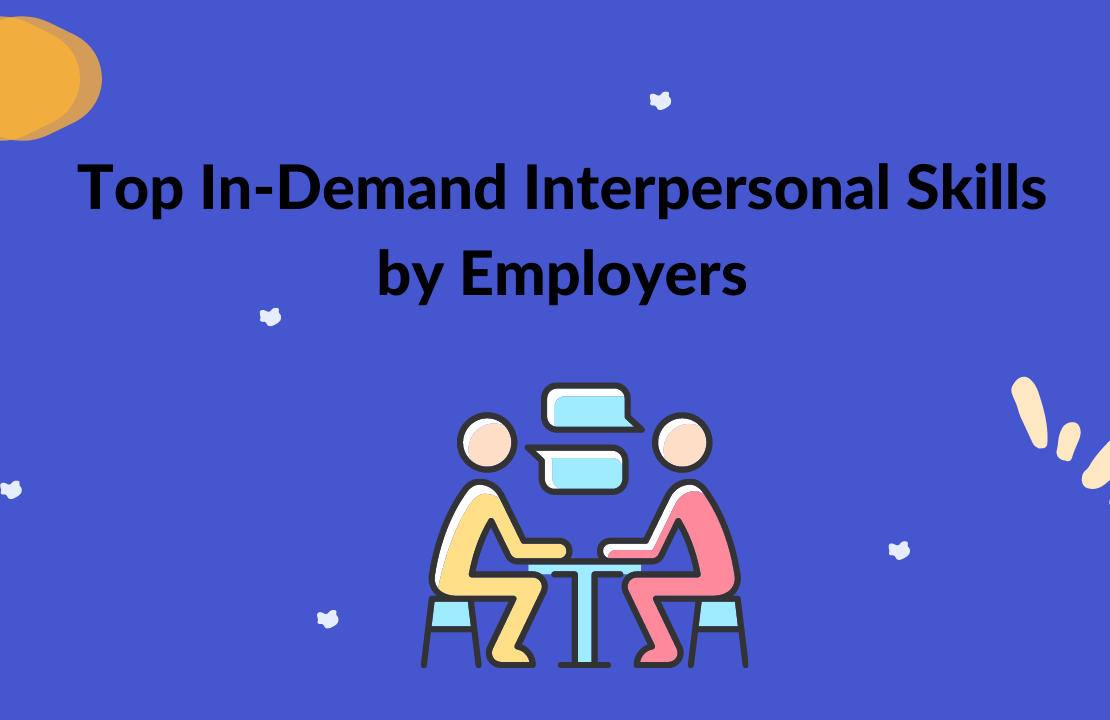Table of Contents
So, you’ve got the relevant background and the technical skills needed for your dream role. You may wonder, “Phew, that’s all I need to land the job, right?” Well, not really. Employers are increasingly searching for another critical layer of skills in candidates: interpersonal skills.
Interpersonal skills are extremely valuable to companies. They underpin a candidate’s ability to work well with others and for the business to run smoothly. This article discusses the top interpersonal skills that companies value, how to cultivate them, and effectively showcase them during your job search.
What are interpersonal skills?
Also referred to as people skills, employability skills, or life skills, interpersonal skills are the set of skills you use to interact with and relate to people, both individually and in groups. Interpersonal skills are a subset of soft skills. In a business setting, they refer to your personality traits and attributes that make you a good employee to work with. Interpersonal skills cover a wide range of the spectrum, from talking politely to being able to resolve conflicts effectively.
Which jobs require interpersonal skills?
Though interpersonal skills are essential for every job role, some professions require them more than others. Jobs that involve constant interaction with other people, such as sales, customer service, public relations, and teaching, require strong interpersonal skills. Thus, if you plan to take up a role where you need to interact and work closely with other individuals, ensure you have strong interpersonal skills and effectively highlight them in your career documents.
Top interpersonal skills that employers value
Here are the 8 most popular interpersonal skills that hiring managers look for in candidates:
1) Communication
Communication is undoubtedly the most sought-after interpersonal skill in today’s workplace. In fact, a study showed that oral communication is the top skill employers look for in new hires. Communication skills are needed in virtually every job, regardless of the job function or the industry.
It refers to one’s ability to express and convey ideas, thoughts, and feelings effectively. Communication is an umbrella phrase that covers a wide range of skills, from active listening to speaking and writing. Being able to communicate well is crucial to both your personal and the company’s success.
Here are some examples of communication skills:
- Active listening
- Public speaking
- Written communication
- Presentation
- Inquiry
2) Leadership
Leadership is an important trait to have for managerial roles. But even for junior positions, where you aren’t required to be directly responsible for others, being able to lead and motivate people can set you apart from other candidates. This is because employers like to evaluate the leadership potential of their potential employees. Employers don’t want to hire a yes-worker or a lazy employee. They look for candidates who can take initiative, lead by example, and look out for the company.
Here are some examples of leadership skills:
- Mentoring
- Instructing
- Delegating
- Encouraging
- Inspiring
3) Teamwork
The ability to work well in a group setting is a strong selling point for hiring decision-makers. As companies place a stronger emphasis on collaborative problem-solving, being a good team player is becoming increasingly important. Modern workplaces often require employees to support each other in some capacity. Even if your role involves a lot of independent work, you may still be required to occasionally collaborate or cooperate with other co-workers.
Here are some examples of teamwork skills:
- Collaborating
- Cooperating
- Team building
4) Empathy
Empathy refers to the ability to understand others and relate to their emotions. It is the true cornerstone of interpersonal skills and an important attribute to have in a good employee. Knowing how to be empathetic can help you develop positive relationships. A colleague may reach out to you with a problem, or a client may have a complaint. Having empathy enables you to understand their perspective and treat them with compassion.
Here are some examples of empathy skills:
- Mindfulness
- Compassion
- Active listening
- Perceptiveness
5) Conflict management
Companies value candidates who are good at managing difficult situations. You will likely be required to settle a tense situation or a disagreement at some point in your job. The conflict may be between co-workers, a customer, and your company, or yourself and a co-worker. To be good at managing conflicts, you should be able to listen fairly to all parties, understand their basis of differences, and creatively arrive at a solution.
Here are some examples of conflict management skills:
- Mediation
- Persuasion
- Problem-solving
- Patience
6) Negotiation
Negotiation is a valuable skill to have for several job positions. It involves engaging with another person to arrive at a mutual agreement. Depending on the job, it may involve formulating formal contracts with clients or interacting with a co-worker to determine the right action. To be an effective negotiator, you should be able to understand the other person’s perspective, develop a mutually beneficial solution, and convince the other party to accept the solution.
Here are some examples of negotiation skills:
- Planning
- Strategizing
- Convincing
- Cooperating
7) Adaptability
Are you flexible and willing to try new things? Do you accept changes with a positive attitude? Are you able to acclimate to new technologies or processes? In today’s ever-changing and complex business landscape, employers seek candidates with strong adaptability skills. It is especially an important interpersonal skill to have for senior-level roles. According to a study, C-suite leaders felt adaptability was among the 5 top skills they needed to succeed in the workplace.
Here are some examples of adaptability skills:
- Flexibility
- Positivity
- Stress management
- Prioritizing
8) Creativity and innovation
Creativity and innovation are critical workplace skills that will give you an edge during your job search. These skills are especially crucial in today’s digital age, and their importance will only continue to grow. A company can’t grow without creativity and innovation. Anyone who is willing and able to think outside the box and offer new or innovative ideas is an asset to the employer. Employees with these skills can help companies improve processes, develop new offerings and solve complex business problems.
Here are some examples of creativity and innovation skills:
- Curiosity
- Open-mindedness
- Imagination
- Risk-taking
- Problem-solving
How to highlight interpersonal skills in your job search
Besides showcasing your hard skills, it’s important to demonstrate your interpersonal skills on your job applications. By doing so, you can show prospective employers how you’ll make a great addition to the company. In the following section, we outline different ways to weave your interpersonal skills into your application documents and interviews.
1) Showcasing interpersonal skills on your resume
Before listing your interpersonal skills, it’s a good idea to review the job description of the target position to identify what your prospective employer is looking for and evaluate how they match your experiences and abilities. This can help you narrow down the skills you could focus on. On your resume, you can leverage the following sections to exhibit your interpersonal skills:
a) Professional summary section: The professional summary section can be a powerful place to highlight your top-notch interpersonal skills. Identify two or three core interpersonal skills you want the hiring decision makers to know the most about you and focus on these while writing your summary. Remember to be brief and to the point.
Resume summary example highlighting communication skills:
“A trilingual (Arabic, French, English), concise, and succinct communicator with proven ability in effective stakeholder management and relationship building through excellent interpersonal skills. Proficient at distilling advanced analytical concepts into simple action points tailored to the target audience.”
b) Key skills section: On your resume, list a few interpersonal skills under the key skills section. The key skills section provides the hiring decision-maker with a quick overview of what you bring to the table and should be a good mix of hard and soft skills. When mentioning your interpersonal skills, we suggest adding specifics to provide appropriate context to the hiring manager and allow them to understand your abilities better.
For example, say you want to highlight your leadership abilities in your resume. You can write “Leadership skills” and leave it at that, but it won’t be as impactful. Instead, to give more depth, you could write something like “Cross-Functional Global Leadership Skills”. Being more precise could make it easier for the employer to gauge your candidacy.
Skills section example highlighting interpersonal skills:

c) Professional experience section: Now is the time to put into play the “show don’t, tell” mantra. In this section, instead of simply listing your skills, you can showcase how you’ve employed the specific skills in various work situations and the results you’ve achieved. We suggest formatting your bullet points using the STAR (Situation, Task, Action, Result) method to create impactful descriptions of your work experience.
Work experience section example highlighting interpersonal skills:
“Leveraged excellent communication skills to coordinate the migration of critical ERP systems from Brazil to North America; established trust and credibility with local leadership and information technology teams to achieve business continuity goals and ascertain seamless transition; identified a 50% performance improvement after the migration.”
2) Showcasing interpersonal skills on your cover letter
The cover letter is one of the best places to demonstrate your interpersonal skills. As the scope of storytelling on a cover letter is high, you can comprehensively illustrate your interpersonal skills with anecdotes and past experiences. Remember to emphasize what you achieved by using these skills. You could also mention how the particular skill could enable you to perform the job better or how it could be useful to your prospective employer.
Cover letter example highlighting interpersonal skills:
In my previous role as a Project Manager at ABC Company, I managed many critical projects, including designing the flagship CRM system for one of our biggest clients. When a technical issue delayed an important project milestone, I formed an all-team triage system and rapid feedback flow so that we could complete other project sprints timely. We successfully launched the system 45 days before the deadline. Having spearheaded a cross-functional team, I learned valuable lessons in teamwork and the importance of building a shared vision. I can bring to XYZ company hands-on experience in leading global teams to success, expertise in stakeholder management, and the ability to thrive in the face of challenges.
3) Showcasing interpersonal skills during a job interview
During your job interview, do remember that your interpersonal skills matter. The employers will observe how attentively you’re listening, whether you are courteous, and how you are communicating. Thus, while you may be prepared to answer technical questions, do also pay attention to your social skills, body language, and behavior.
Also, the employer may ask questions in which you need to provide examples of past behavior. This is an excellent opportunity to show off your interpersonal capabilities. For example, they may ask, “Can you tell me about a time when you had to resolve a conflict?” While answering, remember to provide an anecdote of a time when you demonstrated conflict-management and problem-solving skills and describe the impact you were able to make.
How to improve interpersonal skills
Now that we know how vital interpersonal skills are, let’s look at ways how you could enhance them. If you feel you aren’t naturally born with strong interpersonal skills, don’t worry! There are many ways in which you can improve. Here are some tips for boosting interpersonal skills:
a) Solicit feedback: If you want to understand how others feel when you interact with them, no one knows better than those people themselves. Reach out to someone who knows you well, maybe a friend, family member, or a trusted colleague, and ask for constructive feedback. Listen to their input with an open mind, and use it to identify specific ways in which you could improve yourself.
b) Practice self-reflection: Self-assessment is a great way to learn from your mistakes and grow continuously. Thus, take some time to think about your behavior and conversations and evaluate how you could have been better. You might find it helpful to maintain a journal and note down your reflections. You could also undertake online interpersonal skill assessments to identify areas of improvement.
c) Take a class: Just like other skills, interpersonal skills can also be learned and improved upon. Many online and offline resources such as workshops, classes, and books are available, which you can use to build your interpersonal skills. Through these courses, you can learn tried and tested techniques to improve your emotional intelligence in the workplace. Here is a list of some online resources you may find helpful:
- Successful Negotiation: Essential Skills and Strategies
- Developing Interpersonal Skills
- Soft Skills: The 11 Essential Career Soft Skills
d) Practice on the job: Perhaps, the best way to enhance your interpersonal skills is on your actual job. While it could initially feel awkward, you might need to step out of your comfort to strengthen your interpersonal skills. For example, if you feel uncomfortable speaking at meetings, take baby steps and motivate yourself to start sharing something small. Also, it could be beneficial to observe the successful interactions around you and emulate their behavior in your practice.
When companies are hiring, interpersonal skills are one of the primary criteria they use to assess job applicants. Thus, make sure to weave in the relevant people skills in your job application and demonstrate your emotional intelligence during the job interview. If you are confused about how to effectively showcase your skills while applying for jobs, consider seeking professional help.








